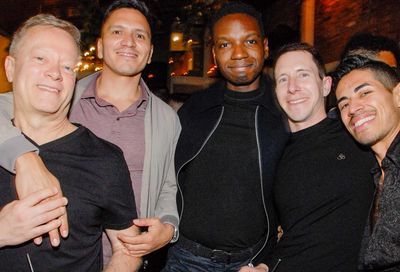Congressman Ritchie Torres urges government to collect LGBTQ data on COVID-19’s impact
Congressman calls failure of health officials to collect data a form of "systemic homophobia."

A New York congressman has called on the Department of Health and Human Services to collect comprehensive data on how the COVID-19 pandemic is affecting LGBTQ individuals.
U.S. Rep. Ritchie Torres (D), who is gay, has circulated a letter among his colleagues calling on HHS to collect LGBTQ data on factors including infection rates, comorbidities that put people at higher risk of health complications from the virus, hospitalizations, deaths, treatments, and the rate of vaccination. Sixteen members signed on in support of the letter.
Torres would like the LGBTQ data to be made publicly available, but most states and health systems are not collecting data on sexual orientation or gender identity.
Even in California, where Gov. Gavin Newsom signed a bill into law intended to facilitate the sharing of LGBTQ data, advocates have expressed frustration that local health systems and county health departments — not to mention the state Department of Health — appear to not be complying with the law.
Similar criticisms have emerged from Pennsylvania — which announced it would begin collecting LGBTQ data last May — where advocates claim the state Department of Health’s demographic questions don’t provide a clear enough picture of the virus’ impact on the community or how successful efforts to get LGBTQ individuals vaccinated have been,
Writing to Acting HHS Secretary Norris Cochran IV, Torres and his fellow members of Congress have asked the department to coordinate with state officials and health systems on how to collect and track LGBTQ-related data.
“The Centers for Disease Control and Prevention recently released an in-depth study on the potential impact of COVID-19 on the LGBTQ+ population,” the letter reads. “The findings conclude that the United States lacks ‘information on sexual orientation, hampering examination of COVID-19-associated disparities among sexual minority adults.’ This dearth of information is especially troubling given that those in the LGBTQ+ community have a higher prevalence of underlying conditions, including asthma, cancer, obesity, and stroke, associated with severe COVID-19 outcomes than heterosexual individuals.”
Noting that health officials have been able to collect data and draw conclusions about the virus’ impact on communities of color, the members of Congress say similar steps can be taken to collect LGBTQ data.
“No patient should be required to identify themselves, given the longstanding stigma and discrimination faced by the LGBTQ+ community as well as the barriers to obtaining compassionate care,” they write. “However, if we do not even attempt to ask basic demographic questions, we are contributing to the erasure of the LGBTQ+ community at a time of significant vulnerability.
“The data collected from this pandemic will provide lessons for emergency preparedness for years, if not decades, to come. If we fail to collect this data now, the LGBTQ+ community will be likely be among the most vulnerable again when the next pandemic or health crisis hits.”
Related: COVID-19: Nonwhite LGBTQ people tested positive at twice the rate of white straight people
Torres, who represents the Bronx, which was hit hard by the COVID-19 pandemic, told Metro Weekly in an interview that he’s heard some anecdotal stories about how COVID-19 is affecting the LGBTQ community. He also knows of some third-party research, such as that done by the Williams Institute at the UCLA School of Law, which has examined vulnerabilities to COVID-19 among particular LGBTQ sub-groups such as transgender people or elders. But there simply isn’t enough data for public health officials to draw firm conclusions.
“The problem is a lack of knowledge. Even though LGBTQ people face a higher risk of infection, hospitalization, morbidity and mortality, there is no reporting of COVID’s impact on the LGBTQ community,” Torres said. “We are less than an afterthought. We’re not even a thought. And as far as I’m concerned, overlooking the LGBTQ community, as though it were invisible, as the federal government has done, is a form of systemic homophobia.
“In government, we can only manage what we measure and the government does not know the extent to which the LGBTQ community has been hit by the pandemic. Nor does the government know the extent to which the LGBTQ community has been left behind by the vaccination campaign,” he added. “It’s clear the government neither knows nor cares to know the full impact of COVID on the LGBTQ community, and that, to me, is unacceptable.”
Torres hopes that pushing HHS to prioritize data collection will lead to increased pressure on states and public health officials to collect the necessary data and monitor COVID’s impact on vulnerable communities — something he notes that even some of the most allegedly “pro-LGBTQ” states have failed to do. As an example, he points to his home state of New York, which, despite being the birthplace of Stonewall and the modern-day LGBTQ rights movement, does not collect LGBTQ-specific data.
“Forget about red states and blue states: the scandal is not that the government is failing to collect data on the LGBTQ community, the scandal is that the government is not even trying,” he said.
Regarding support from his congressional colleagues for such efforts, Torres said he encouraged them to sign on to the letter, but was not obsessing over head-counting.
“It’s not a numbers game. Ultimately, the objective here is about using whatever platform we have as members of Congress to highlight a real failure of reporting that comes at the expense of my community, the LGBTQ community,” he said.
Read more:
Belgian prime minister flies rainbow flag in response to gay man’s murder
Michigan trans female inmate sues state after being raped by cellmates in male prison
Republican lawmaker apologizes for referring to LGBTQ people as having “deviant sexuality”
Support Metro Weekly’s Journalism
These are challenging times for news organizations. And yet it’s crucial we stay active and provide vital resources and information to both our local readers and the world. So won’t you please take a moment and consider supporting Metro Weekly with a membership? For as little as $5 a month, you can help ensure Metro Weekly magazine and MetroWeekly.com remain free, viable resources as we provide the best, most diverse, culturally-resonant LGBTQ coverage in both the D.C. region and around the world. Memberships come with exclusive perks and discounts, your own personal digital delivery of each week’s magazine (and an archive), access to our Member's Lounge when it launches this fall, and exclusive members-only items like Metro Weekly Membership Mugs and Tote Bags! Check out all our membership levels here and please join us today!





















